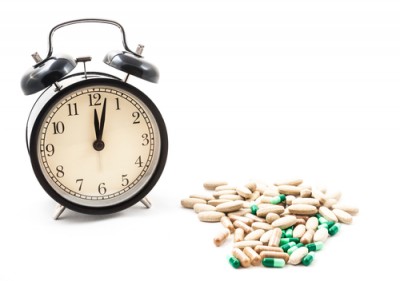
Most people who take nutritional supplements grab a handful and toss them all down the gullet first thing in the morning. But if you’re going to the trouble to learn about your essential nutritional needs—and spending hard-earned money to buy the right supplements—it only makes sense that you also learn when to take them so you will get the most benefit.
This list will guide you as to which vitamins and minerals should be taken before meals, after meals, and between meals. Remember, though, due to the vast number of combination vitamins, use this as a general guide only.
Take These Before Meals
- Multivitamin or multimineral formula
- Digestive aide for the gallbladder
- Vitamin B complex
- Individual B vitamins
- Vitamin C complex
- Individual minerals (calcium, potassium, etc.)
- Iron supplements
- Lecithin
- Manganese
- Protein powder (unless used in diet for blood sugar, weight loss, etc.)
Take These After Meals
- Vitamin A
- Vitamin D
- Vitamin E
- Vitamin K
- Chlorophyll (oil soluble)
- Choline
- Digestive enzymes (pepsin, HCL, etc., all those except for the gallbladder)
- Herbs used to aid digestion (comfrey, pepsin, etc.)
- Inositol
- Iodine (unless instructed otherwise)
- Most oils or oil-based nutrients (linseed oil, evening primrose oil, wheat germ, etc.)
- R.N.A. (ribonucleic acid)
- Yeast products (Brewer’s yeast tablets, lactic acid yeast, etc.)
Take These Between Meals
- Chlorophyll (water soluble)
- Glandulars and similar tissue extracts
- Most herbs (except for those used in digestion)
- Phosphorus
- Sodium products

